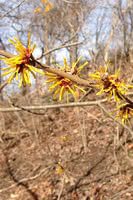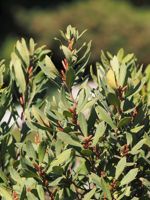Mon-Fri 9am - 5pm Mountain time
Witch Hazel vs Sweet Gale
Hamamelis virginiana
Myrica gale
NOT AVAILABLE THIS SEASON - MIGHT RETURN
CUSTOM GROW
Witch Hazel is a deciduous shrub, or small tree, with a short trunk, bearing numerous spreading, crooked branches.
The seeds grow in a long, wooden pod with two to four seeds per pod. Upon ripening, the pods burst, firing the seeds up to 30km an hour.
The leaf and bark extract of Witch Hazel has been used as a remedy to common ailments such as inflammation, bruises and much more for many centuries.
Sweet Gale is a native, nitrogen-fixing shrub known for its aromatic foliage. Tiny glands on the leaves release a balmy, bay leaf-like scent with floral and citrus notes. In spring, the yellowish male catkins provide one of the earliest sources of pollen for bees and other insects. While later in the season, the female catkins produce seeds that are eaten by waterfowl. Sweet Gale is dioecious, meaning male and female flowers occur on separate plants.
Sweet Gale thrives in wet, acidic soils and is commonly found along wetlands and lakeshores. It can help stabilize shorelines, while its dense growth provides valuable cover for wildlife. It is well-suited for naturalization, wetland restoration, and erosion control projects.

